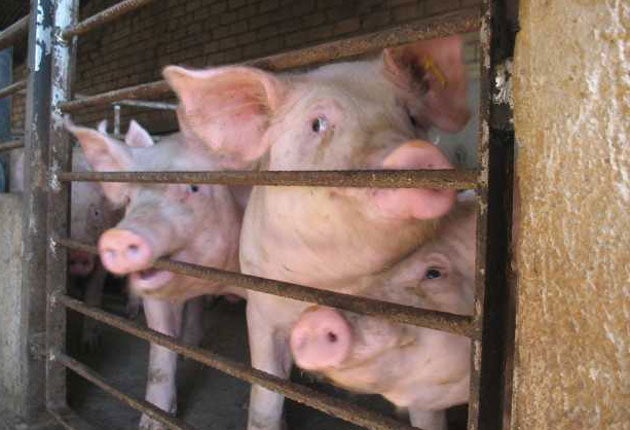Revealed: the cruelty of UK's pork suppliers
Investigation exposes conditions that drive distressed pigs to cannibalism

Your support helps us to tell the story
From reproductive rights to climate change to Big Tech, The Independent is on the ground when the story is developing. Whether it's investigating the financials of Elon Musk's pro-Trump PAC or producing our latest documentary, 'The A Word', which shines a light on the American women fighting for reproductive rights, we know how important it is to parse out the facts from the messaging.
At such a critical moment in US history, we need reporters on the ground. Your donation allows us to keep sending journalists to speak to both sides of the story.
The Independent is trusted by Americans across the entire political spectrum. And unlike many other quality news outlets, we choose not to lock Americans out of our reporting and analysis with paywalls. We believe quality journalism should be available to everyone, paid for by those who can afford it.
Your support makes all the difference.Pigs so crazed by cramped and filthy conditions that they resort to gnawing at each other are being supplied by farmers to British shops, a European study by a respected animal charity shows.
Investigators from Compassion in World Farming found 80 per cent of farms across five European countries engaging in illegal practices such as barren pens and routine tail-docking.
In one of the biggest undercover inquiries into pig-farming, CIWF visited 60 farms across five big pork-producing states, Spain, the Netherlands, Germany, Hungary and Britain.
In 48 farms, farmers had cut the tails off pigs to stop them biting each other, despite EU rules restricting tail-docking. Some 47 failed to provide anything for the pigs to root around in, despite an EU requirement to provide "environmental enrichment" such as straw. Most farms made widespread but legal use of metal cages for confining pregnant pigs. Overall, Spain had the worst conditions, followed by the Netherlands, Germany, Hungary and Britain.
The six-month investigation gives credence to complaints from British farmers that they are facing unfair competition from the Continent where pigs are kept in worse conditions. But even in Britain, CIWF said, people would be shocked by poor conditions for pigs.
"Most pigs in the EU suffer greatly in the harsh world of factory farming," said CIWF's chief policy adviser, Peter Stevenson. "Although conditions in the UK are better, we still need the pig industry to raise their game because many UK pigs continue to be kept in conditions that are inhumane and unlawful."
CIWF launched its exhaustive investigation ahead of a European Commission review next year of welfare legislation, the Pig Directive.
Pig-farming will come under scrutiny in the UK next month when Channel 4 screens a one-off programme by Jamie Oliver. The chef – whose friend, the TV presenter Jimmy Doherty, is an organic pig farmer – is expected to focus on the difference between British and Continental pig farming.
Farmers are still allowed to use sow stalls which prevent pigs from moving for a month while they wean their piglets. Campaigners say the practice is unnecessary in less intensive systems and the EU has agreed, banning it across Europe from 2013. In Britain, farmers use farrowing crates, which are less severe but still heavily restrict movement. The British Pig Executive says the UK imports most of its pigmeat, 81 per cent of bacon and 45 per cent of pork such as ham, sausages, and chops. Forty per cent of imports come from Denmark, which was not included in the study, though CIWF said farms there were similar to those in the Continental countries it visited.
In Spain, CIWF found many individual animals were in poor condition across a range of farms, suffering from various injuries including ear-biting. "Aggression, apparently caused by environmental factors such as lack of space was a significant trait observed in this country," it said. "A significant number of tail-docked pigs were present in 11 out of the 11 farms. There was no environmental enrichment."
Labelling: What to buy
*Organic: particularly Soil Association scheme, which guarantees highest welfare standards
*Free-range, outdoor-bred and outdoor-reared: should be higher welfare, but labels lack legal definition
*RSPCA Freedom Food: higher welfare but allows limited use of farrowing crates
*British: not a guarantee of good welfare but probably better than imports, unless a supermarket stipulates otherwise
Join our commenting forum
Join thought-provoking conversations, follow other Independent readers and see their replies
Comments